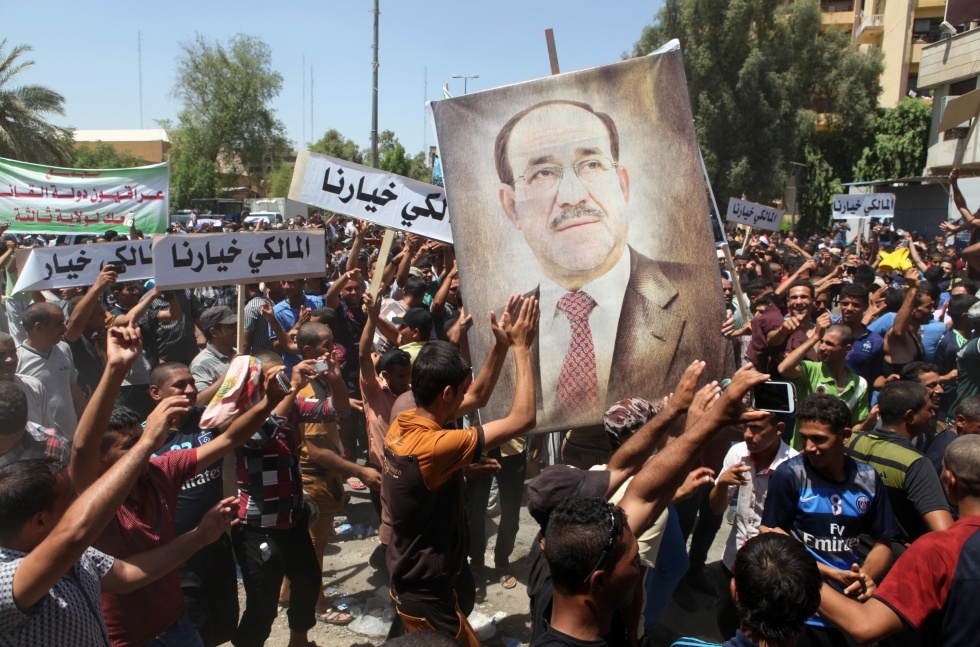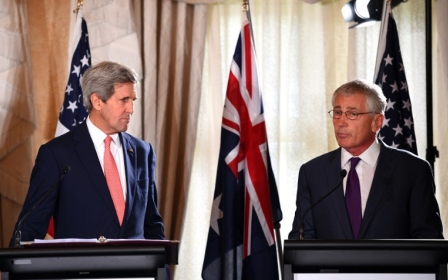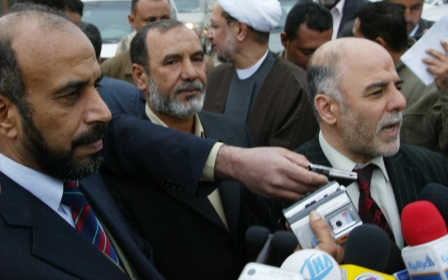Iran endorses Maliki's rival for Iraqi prime minister

Iran, a key ally of Iraq's sidelined Prime Minister Nouri al-Maliki, said Tuesday that it backed the legal process which led to him being replaced, following the nomination of Haider al-Abadi as premier.
The statement was the first official signal that Maliki no longer enjoys the support of his fellow Shiite leaders and politicians in Tehran to stay on as head of government in Baghdad.
Ali Shamkhani, secretary and representative of supreme leader Ayatollah Ali Khamenei on Iran's Supreme National Security Council, made the remarks at a meeting of Iranian ambassadors in Tehran, the Fars and Mehr news agencies said.
"The framework provided by the Iraqi constitution stipulates that the prime minister has been chosen by the majority group in the parliament," Shamkhani said, while calling on "all groups and coalitions in Iraq to protect the national interest" and to take steps to "deal with external threats".
Iran was influential in ensuring that Maliki retained the post of prime minister and served a second term following Iraq's inconclusive general election in 2010.
Maliki won the largest number of seats in elections last April, but still less than the minimum required to form a government.
In addition, the country's politics have been overshadowed by a militant surge in the north, which he has failed to quell. His increasingly use of sectarian politics has also been blamed for further fuelling divisions, and left him unable to for a new government.
After months of political turmoil, Iraq's President new Fouad Masoum on Monday tasked Abadi, who was deputy speaker of the parliament and stems from the same political block as Maliki to form a new government.
The move has been fiercely denounced by Maliki who called it unconstitutional and said he would not step down. Supporters of the embattled PM took to the streets on Monday afternoon, waving Iraq flags and shouting support for the Shiite block leader.
The police and army also took to the streets, and reportedly blocked off roads and key government buildings late on Sunday, as Maliki gave the first of his two defiant speeches.
There have since been concerns that the army would stay loyal to Maliki, although Maliki on Tuesday afternoon issued a statement urging the army to stay out of the "political crisis." The army has also been keen to stress that it was “the army of Iraq, not of Maliki.”
Hopes are now high that Abadi will be able to forge a national unity government, and slowly begin the process of stabilising the conflict-hit country.
Saudi Arabia sees 'happy news'
Saudi Foreign Minister Saud al-Faisal on Tuesday said the nomination of Abadi as the new prime minister of Iraq to replace Maliki was "happy news".
Saudi Arabia had strained ties with Maliki, whom it accused of creating the conditions for a militant-led offensive by marginalising Iraq's Sunni Arabs.
"This is the happiest news I heard lately," the veteran diplomat said during a news conference in the western Saudi city of Jeddah, when asked to comment on Abadi's nomination.
The news was also welcomed by the Arab League, whose chief Nabil al-Arabi on Tuesday backed the nomination of Abadi.
Arabi "welcomed Iraqi President Fuad Masum's tasking of Haidar al-Abadi to form a new government," a statement said.
International support for the prime minister-designate Abadi, a member of his Dawa party, has poured in, most importantly from Washington and Tehran.
US Secretary of State John Kerry said "we stand absolutely squarely behind President Masum (who) has the responsibility for upholding the constitution of Iraq."
And in a further rebuke, Kerry had said prior to the announcement of Abadi's selection that Iraqi Shiites have "three candidates or so for prime minister. None of them are Mr. Maliki."
Maliki's bid to cling to power at dead end
"Maliki politically is finished," said Hayder al-Khoei, an associate fellow at the Chatham House think-tank. "I just can't see him staying in terms of the legal, democratic framework."
However, he added that Maliki has "a vast security network - he has intelligence men, security officers" who are "certainly not loyal to the state of Iraq. They're there because they owe their jobs and their livelihoods to Maliki."
"So I never rule out Maliki - he's been a survivor, he's proved himself time and time again," said Khoei.
Iran's desire to maintain the unity of the Shiite bloc in Iraq, which is threatened by Maliki's vocal opposition to Abadi, is an important factor, he said.
"This line was crossed in a very public and ugly fashion," Khoei said, predicting that Tehran would "tell Maliki this is not viable, you cannot remain in power".
John Drake, a security analyst with AKE Group, said that Maliki "has a lot of leverage, but he will struggle now that international players have congratulated Abadi."
"The concern is his influence in the security forces and whether or not he could stage some sort of in-situ coup, but this will be difficult without the backing of significant portions of the security forces - as well as the Shiite militia groups."
Kirk Sowell, the Amman-based publisher of the Inside Iraqi Politics newsletter, said that Iran's declared support for Abadi clearly shows that even the last-ditch option of a coup aimed at keeping Maliki in power is increasingly unlikely.
"With Iran against him, as opposed to being neutral... I can't imagine they would even try," Sowell said.
"It's finished," he said of Maliki's bid for a third term.
Maliki has moved from an obscure exile regarded as a weak compromise candidate in 2006 to a powerful prime minister who maintained tight control over security forces and is widely reviled among Iraq's Sunnis.
Sunni anger has played a major role in a more than 15-month surge in violence in Iraq, which culminated in a sweeping insurgent offensive that began in June and has overrun large areas of five provinces.
But Maliki has made little in the way of concessions to Sunni Arabs, instead unsuccessfully seeking to address the problem with military force.
Stay informed with MEE's newsletters
Sign up to get the latest alerts, insights and analysis, starting with Turkey Unpacked
Middle East Eye delivers independent and unrivalled coverage and analysis of the Middle East, North Africa and beyond. To learn more about republishing this content and the associated fees, please fill out this form. More about MEE can be found here.




